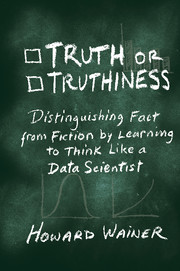Book contents
Section III - Applying the Tools of Data Science to Education
Published online by Cambridge University Press: 05 December 2015
Summary
Introduction
From 1996 until 2001 I served as an elected member of the Board of Education for the Princeton Regional Schools. Toward the end of that period a variety of expansion projects were planned that required the voters pass a $61 million bond issue. Each board member was assigned to appear in several public venues to describe the projects and try to convince those in attendance of their value so that they would agree to support the bond issue. The repayment of the bond was projected to add about $500 to the annual school taxes for the average house, which would continue for the forty years of the bond. It was my misfortune to be named as the board representative to a local organization of senior citizens.
At their meeting I was treated repeatedly to the same refrain: that they had no children in the schools, that the schools were more than good enough, and that they were living on fixed incomes and any substantial increase in taxes could constitute a hardship, which would likely continue for the rest of their lives. During all of this I wisely remained silent. Then, when a pugnacious octogenarian strode to the microphone, I feared the worst. He glared out at the gathered crowd and proclaimed, “You're all idiots.” He then elaborated, “What can you add to your house for $500/year that would increase its value as much as this massive improvement to the schools? Not only that, you get the increase in your property value immediately, and you won't live long enough to pay even a small portion of the cost. You're idiots.” Then he stepped down. A large number of the gray heads in the audience turned to one another and nodded in agreement. The bond issue passed overwhelmingly.
Each year, when the real estate tax bill arrives, every homeowner is reminded how expensive public education is. Yet, when the school system works well, it is money well spent, even for those residents without children in the schools. For as surely as night follows day, real estate values march in lockstep with the reputation of the local schools. Of course, the importance of education to all of us goes well beyond the money spent on it.
- Type
- Chapter
- Information
- Truth or TruthinessDistinguishing Fact from Fiction by Learning to Think Like a Data Scientist, pp. 139 - 142Publisher: Cambridge University PressPrint publication year: 2015



